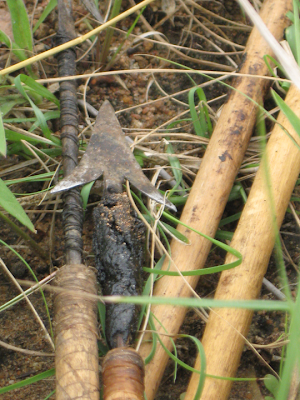Men, on the other hand, "hunt" all day long. We went on a "hunt" with them, but I suspect it was really a honey gathering mission, because honey is what makes the world go round for the Hadza. They kept telling us we were hunting giraffe and there was one just over this ridge, but all we ever did was collect honey.
Before going we had read that the honey from the valley where the Hadza stay is highly valuable, but no other group has tried to harvest it. I wondered why, but then I saw the collection of the honey and I understood. This is the process:
- beehives are located within trees
- When the Hadza spot the telltale signs of a beehive (not sure what these are, I assume they're bees and maybe a buzzing sound) they build a fire
- They climb the tree
- They use an axe to hack a hole in the tree about a foot below the beehive
- They put a smoking log from the fire into the hole
- The smoke rises, slightly disorienting the bees but mostly just pissing them off and getting them to buzz around
- When most of the bees have left the hive, the Hadza man simply reaches up into the hole and grabs huge pieces of honeycomb. Needless to say, they suffer numerous bee stings, they just don't give a shit
The honey is by far the best I've ever tasted, but they eat so much. On our hunt we found four different beehives and collected honey from all of them. At the last one, one of the men came up to me and told me that the bees were very dangerous and pointed to his eyes. I found out later that those bees are the type that specifically try to sting you in your eyes. (notice the frightened look on my face in the picture above.) I probably ate the equivalent of two of those bear-shaped bottles of honey. On the hunt I went on we ate all the honey we collected (they told me they consume over 20 pounds of honey a week), but the Hadza usually trade it to neighboring tribes for four-inch long nails that they pound into arrowheads and marijuana that they smoke. And a lot.
They probably hunt in earnest when they don't have four loud tourists tromping around behind them. In fact, a Hadza man's only possessions are the clothes on his back, an axe (for collecting honey), and handmade bows and arrows. They put a strong natural poison on the arrow just below the arrow head. They hunt every animal except elephants because their poison isn't strong enough to kill elephants. I met an old man who told me he'd killed over 20 giraffes in his life.
We're taught from a very young age that the history of life on earth is:
- big bang
- lava
- bacteria
- fish
- lizards
- mammals
- chimpanzees
- hunter gatherers
- farmers
- modern man
They don't lead hard lives-- if they do any hard manual labor, it's only for a couple hours a day. The rest of the time is spent hunting/collecting honey, or singing and dancing. They were also very easy to interact with on a personal level even though most of us know very little Swahili. Every single other group of people in Tanzania has had serious drought and starvation in the last 50 years except the Hadza.
The first night I was there we were talking to the Hadza around a fire. One of the men, Moshi, told us there were no kids in the camp because they had all gone out to collect fruit three days ago. I was a little alarmed by that and I asked when they would be back. He said he didn't know, but that it had been raining for the last three days, and where they went there is no shelter from the rain, so he thought they would probably return soon. Now I was a little horrified and I asked if they had asked permission to go. He started laughing hysterically and said, "why would they ask for permission? There is nothing wrong with collecting fruit!" Kids acquire all the necessary survival skills by the time they're seven or eight years old, and it's not uncommon for them to go out by themselves.
The Hadza are only located about 30 miles south of the Laetoli footprints, the oldest archaeological evidence of homo sapiens. There is evidence that their valley has been inhabited constantly for over 100,000 years, and the land looks pretty much the same as it did 100,000 years ago. Just something to think about in the context of global warming.
In other news, the little kids there were just like the kids Meru in that they cried every time I came close to them. I also didn't shower all week.
Aaron





Awesome, straight out of Human Planet
ReplyDeleteI hope you didn't get any bee-stings on your eyeballs!
ReplyDeleteSonia
wait i don't get it, so they don't have jobs?
ReplyDeleteyo do they have twitters? everyone in the house just got one (i did not) and they need a lot more followers
ReplyDelete